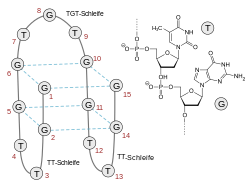Chemistry:BC-007
 | |
| Clinical data | |
|---|---|
| Other names | Rovunaptabin
|
| Routes of administration | Infusion |
| Pharmacokinetic data | |
| Elimination half-life | 2.9-11 min |
| Identifiers | |
| |
| CAS Number |
|
| PubChem CID | |
| PubChem SID | |
| DrugBank | |
| ChEBI | |
| Chemical and physical data | |
| Formula | C150H188N57O97P15 |
| Molar mass | 4806.062 g·mol−1 |
| 3D model (JSmol) | |
| |
| |
BC-007 is an oligonucleotide aptamer, a synthetic DNA compound designed to bind other chemicals.[1] BC-007 is in early-stage clinical trials as a lead compound intended for the potential treatment of heart failure or long COVID. The international nonproprietary name is rovunaptabin.[2]
History
Since the 1990s, GPCR autoantibodies were investigated as possible factors in the pathology of several diseases, including heart disease.[3][4] In parallel, treatment strategies to remove GPCR-AABs were investigated, initially using proteins or peptides to bind the antibodies.[5][6]
In 2013, scientists from the Max Delbrück Center and the Charité Heart Center reported using aptamers as a treatment for dilated cardiomyopathy in people positive for beta-1 adrenergic receptor AABs.[7][8] In 2015–16, scientists reported that two aptamers might bind GPCR-AABs, possibly resulting in an inhibition of GPCR-AABs.[9][10]
The biotechnology company Berlin Cures pursued the development of the aptamer with the nucleotide sequence GGT TGG TGT GGT TGG under the codename BC-007 for the inhibition of autoantibodies in cardiomyopathy.[11]
Properties
BC-007 is a 15-nucleotide single-stranded DNA molecule consisting of nine unmodified deoxy-guanosines and six corresponding deoxythymidines with the sequence 5'-GGT TGG TGT GGT TGG-3'.[1] Its three-dimensional structure allows it to wrap around the target structure of functionally active G-protein-coupled receptor autoantibodies and neutralize their activity.[1]
BC-007 can be synthetically produced, and is considered safe.[1][11] In preliminary human studies, it was given by intravenous infusion and had an in vivo plasma half-life of around 4 minutes.[1]
Research
Heart failure
The removal of pathogenic functional autoantibodies through a medical blood purification procedure, known as immunoadsorption, can stabilize heart function in people with dilated cardiomyopathy who are awaiting heart transplantation.[12][13] In 2018, a Phase I clinical trial found that BC-007 was well-tolerated, with no serious adverse events reported.[1][11] Phase IIa trials demonstrated that BC-007 could neutralize the activity of functional autoantibodies in most subjects treated.[14]
Long COVID
BC-007 is under investigation as a possible agent for treating disorders of long COVID.[15]
References
- ↑ 1.0 1.1 1.2 1.3 1.4 1.5 "BC-007". Römpp [Online]. Georg Thieme Verlag. 2023. https://roempp.thieme.de/lexicon/RD-02-04540.
- ↑ Programme on International Nonproprietary Names (INN), ed (2023-08-06). WHO Drug Information - INN Proposed List 129. 37. INN and Classification of Medical Products (INN). https://cdn.who.int/media/docs/default-source/international-nonproprietary-names-(inn)/pl129.pdf. Retrieved 2023-12-31.
- ↑ "Myocardial injury due to G-protein coupled receptor-autoimmunity". Japanese Heart Journal 39 (3): 261–274. May 1998. doi:10.1536/ihj.39.261. PMID 9711178.
- ↑ "Chapter 3 - Autoantibodies Directed Against G-Protein-Coupled Receptors in Cardiovascular Diseases: Basics and Diagnostics" (in en). The Heart in Rheumatic, Autoimmune and Inflammatory Diseases. Academic Press. 2017-02-17. pp. 49–63. doi:10.1016/B978-0-12-803267-1.00003-X. ISBN 978-0-12-803267-1. https://www.sciencedirect.com/science/article/pii/B978012803267100003X.
- ↑ "Specific removal of beta1-adrenergic autoantibodies from patients with idiopathic dilated cardiomyopathy". The New England Journal of Medicine 347 (22): 1806. November 2002. doi:10.1056/NEJM200211283472220. PMID 12456865.
- ↑ "Effects of protein A immunoadsorption in patients with advanced chronic dilated cardiomyopathy". Journal of Clinical Apheresis 24 (4): 141–149. 2009-07-09. doi:10.1002/jca.20204. PMID 19591221.
- ↑ "The patent situation concerning the treatment of diseases associated with autoantibodies directed against G-protein-coupled receptors". Pharmaceutical Patent Analyst 2 (2): 231–248. March 2013. doi:10.4155/ppa.12.88. PMID 24237028.
- ↑ "Targeting anti-beta-1-adrenergic receptor antibodies for dilated cardiomyopathy". European Journal of Heart Failure 15 (7): 724–729. July 2013. doi:10.1093/eurjhf/hft065. PMID 23639780.
- ↑ "Aptamer BC 007 - A broad spectrum neutralizer of pathogenic autoantibodies against G-protein-coupled receptors". European Journal of Pharmacology 789: 37–45. October 2016. doi:10.1016/j.ejphar.2016.06.061. PMID 27375076.
- ↑ "Aptamer BC007 for neutralization of pathogenic autoantibodies directed against G-protein coupled receptors: A vision of future treatment of patients with cardiomyopathies and positivity for those autoantibodies". Atherosclerosis 244: 44–47. January 2016. doi:10.1016/j.atherosclerosis.2015.11.001. PMID 26584137.
- ↑ 11.0 11.1 11.2 "Berlin Cures Announces Successful Completion of Phase 1 Study of BC 007 for the Treatment of Cardiomyopathy" (in en-US). 22 August 2018. https://www.biospace.com/article/berlin-cures-announces-successful-completion-of-phase-1-study-of-bc-007-for-the-treatment-of-cardiomyopathy/.
- ↑ "The aptamer BC 007 for treatment of dilated cardiomyopathy: evaluation in Doberman Pinschers of efficacy and outcomes". ESC Heart Failure 7 (3): 844–855. June 2020. doi:10.1002/ehf2.12628. PMID 32212256.
- ↑ "Long-term benefits of immunoadsorption in β(1)-adrenoceptor autoantibody-positive transplant candidates with dilated cardiomyopathy". European Journal of Heart Failure 14 (12): 1374–1388. December 2012. doi:10.1093/eurjhf/hfs123. PMID 22892122.
- ↑ "β1-Adrenoreceptor Autoantibodies in Heart Failure: Physiology and Therapeutic Implications". Circulation. Heart Failure 13 (1): e006155. January 2020. doi:10.1161/CIRCHEARTFAILURE.119.006155. PMID 31957469.
- ↑ "A Three-Part, Randomised Study to Investigate the Safety, Tolerability, Pharmacokinetics and Mode of Action of BC 007, Neutraliser of Pathogenic Autoantibodies Against G-Protein Coupled Receptors in Healthy, Young and Elderly Subjects". Clinical Drug Investigation 40 (5): 433–447. May 2020. doi:10.1007/s40261-020-00903-9. PMID 32222912.
External links
 |

